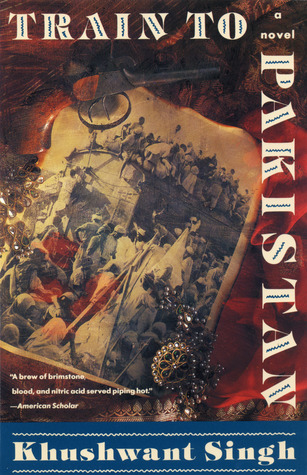

He also tells the subinspector to contact the local Muslim refugee camp and arrange for the evacuation of the Mano Majra Muslims. The magistrate orders the arrest of Malli and his gang, but continues to keep Jugga and Iqbal imprisoned. When he wakes up the next morning, the subinspector tells him Jugga gave him the names of the dacoits who killed Lala Ram Lal. The arrival of the ghost train leaves Hukum Chand shaken as well, and he must cling to Haseena, a young Muslim prostitute the subinspector arranged for him, in order to fall asleep. The outside world is finally pressing in, and no one knows what to do.
The train to pakistan 1947 full#
The villagers don’t know the train is full of dead Hindus and Sikhs until the police and military burn the bodies. One day, a “ghost train” from Pakistan arrives in Mano Majra. A practical, if slightly corrupt man, Hukum Chand instructs the subinspector to keep Jugga and Iqbal in custody, but to continue looking for the true killers. Still, the head constable arrests them, much to the chagrin of his superiors, the subinspector and the magistrate, Hukum Chand. The night of Lala Ram Lal’s murder, Jugga was having a tryst with Nooran, and Iqbal hadn’t yet arrived in Mano Majra. Iqbal Singh is a social worker from Delhi who comes to Mano Majra in hopes of inspiring the locals to take political action in the new India, but he instead gets caught up in the confusion and violence of the frontier. He is the lover of Nooran, the daughter of the village imam, and a bitter enemy of Malli. The town badmash, Jugga is a large young man who has a bad reputation but a good heart. Train to Pakistan begins with the murder of Lala Ram Lal, the Mano Majra moneylender, and one of the few Hindus in the community.Ī dacoit named Malli and his gang of robbers are the ones who kill Lala Ram Lal, but the inept police who oversee Mano Majra and the surrounding villages falsely imprison two men, Juggut “Jugga” Singh and Iqbal Singh, for the crime. They depend on each other and live in harmony. Mano Majra is diverse, made up of Hindus and Muslims, but also Sikhs and Christian sympathizers. In this frenzy of chaos and violence is Mano Majra, one of the last remaining peaceful villages on the frontier. The trains run continually, and people call them "ghost trains." Muslims are deported on trains to Pakistan and Hindus on trains to India (nearly ten million in total) but within weeks, almost a million are already dead. Little by little, death and murder become the normal for these refugees. Some families were displaced after many generations of living in one place or the other.Īs the refugees flee, they are exposed to constant violence which often crops up when Hindus and Muslims are in close proximity. During the Partition of India in 1947, Hindus and Sikhs were made to move to India, and Muslims were forced into Pakistan, regardless of family history. In conclusion, even though the storyline was pretty slow in the beginning, the reality of it, combined with Khushwant Singh’s writing skills is much captivating.This is a story of religious persecution and the aftermath of displacement.Thus, as you proceed towards the climax, the judgment that might hold is that you don’t grasp them well. And the main protagonists are not deftly etched.Moreover, there are several unnecessary characters that weigh on the flow of the story.Nevertheless, there are explicit reports of death and rape.While contrasting numerous occurrences of right and wrong in the simplicity of the plot, the manner in which the author has outlined the concept of guilt is noteworthy.Also, one thing that people often neglect about the book is how intricately the notion of “PRIVILEGES” has been introduced in the story.Making it a brief but thought provoking piece of prose. Being short, the book is a remarkably concise account.Which performs as it wishes while misusing its powers. There are many cases in point of a lawless and deceitful government.And amidst that, he has branched out the instances of particular character developments cleanly.

The author has displayed how every individual, irrespective of their community, was accountable for the happenings.Instead of merely radiating the political one. In essence, the author has portrayed the unvarnished human aspect related to partition and its bitterness.


 0 kommentar(er)
0 kommentar(er)
